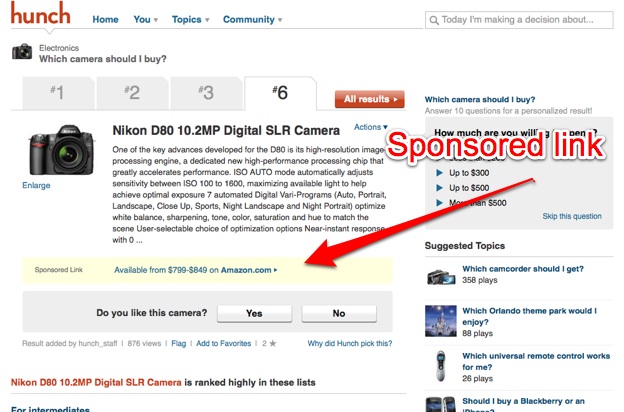
In search, nobody wants to go up against Google. Even Microsoft is trying to position Bing as a “decision engine” even though it is really just a search engine. But Hunch, a startup which launched publicly today, is an actual decision engine. The only thing it attempts to do is help you make a decision through a question-and-answer interface.
Hunch is part of a recent flowering of Q&A sites (such as Aardvark and Mahalo Answers) which address a part of search that is orthogonal to what Google does. In part, these startups are responding to the success of Yahoo Answers, but they also push beyond what Yahoo Answers does. Flickr co-founder Caterina Fake, who worked on Yahoo Answers before she left Yahoo and is now running product design at Hunch, says: “Yahoo Answers is not the answer.”
The problem with Yahoo Answers is that most of the answers aren’t very good. As long as one answer is good, that is the one which comes up highest in results. But it doesn’t really learn from all the answers to a particular question come up with a better answer. Fake explains: “The question has been asked and answered thousands of times. Collective knowledge systems don’t work unless they retain knowledge, you can add knowledge to them in a simple and straightforward way, and it gets smarter every time somebody uses it.”
I had a long discussion with Fake about what Hunch is trying to do on Friday. You can search for questions which have already been entered into the system, or add your own. Each question is actually a series of questions with multiple-choice answers which take you down different paths (or, “decision trees’). The questions and answers are contributed by Hunch’s community (so far the site has been seeded by its 40,000 beta users). “Anyone can add a new set of sub-questions to main question, and improve the overall results in the same way that many people can contribute to the same Wikipedia article to make it better or add tags to someone else’s photos on Flickr. It only takes aminimal effort to make each question marginally better.
For instance, the question “Should I get a convertible?” leads to a series of other sub-questions aimed at helping you make that decision: “Are you okay with the possibility that you’ll pay more for a convertible?”; “How’s the weather in your city/country?”; “Do you live somewhere known for car theft or crime?”; “Do you keep a lot of things loosely scattered around the interior of your car?”; “”Do you often wear fancy or personally valuable hats or scarves?” After you answer all the questions, you get an answer. This could be a yes or no answer or s specific recommendation, such as what blogs you should read.
At the end of this process, you tell Hunch or not you agree with the result. Hunch not only has a results algorithm, but also has a question selection algorithm, which it tunes to each person. Theoretically, the more questions you answer on Hunch, the more it knows about you and the better follow-up questions it can present to come up with the best final answer. It sounds complicated, but the user interface is simple and game-like. You are presented with a series of questions, and you click on the answers which apply to you. Then at the end, you get an answer to the original question you were exploring.
Fake estimates that about 40 percent of the topics on Hunch right now are monetizable with ads or affiliate links. If you try to use Hunch to figure out which camera you should buy, for example, and the answer turns out to be the Nikon D80, already you will see a sponsored affiliate link to Amazon. Other business models might emerge in the future.
Other sites will be able to tap into Hunch’s question-selection and answer-selection algorithms to create their own Q&A system. Using Hunch’s API, a developer could create a custom product recommendation app for retail sites. Bob’s Bait And Tackle shop could set up a series of questions and answers to guide shoppers to the perfect fly or fishing tackle. All of these questions and answers would then feed back into Hunch’s core system. The more people who use the system, the smarter it should get.
